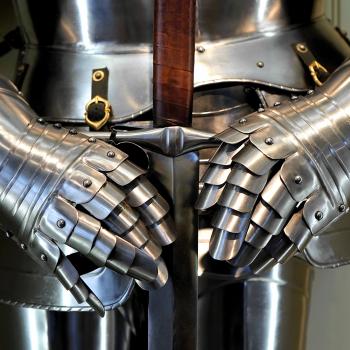To Train Up A Child, pp. 4—5
TRAINING, NOT DISCIPLINE
“Train up a child in the way he should go: and when he is old, he will not depart from it (Prov. 22:6).” Train up, not beat up. Train up, not discipline up. Train up, not educate up. Train up, not “positive affirmation” up. Training is the most obvious missing element in child rearing. Training is not discipline. A child will need more than “obedience training,” but without it everything else will be insufficient.
With all of Michael’s insistence on distinguishing between “training” and “disciplining,” t’s time we pulled out a dictionary.
Train: [with object] teach (a person or animal) a particular skill or type of behavior through practice and instruction over a period of time.
Training a child, then, is, according to the dictionary, about teaching a child—and in this case, teaching a child a particular type of behavior, and doing so through “practice and instruction over a period of time.” Next let’s look at the dictionary definition of discipline:
Discipline: train (someone) to obey rules or a code of behavior, using punishment to correct disobedience.
That sounds like pretty much the same thing as the way Michael is using the word “train.” Sure, the definition of discipline includes the word “punishment,” a term Michael’s trying to avoid here, but as we’ll see the training he prescribes does include punishment—switching a baby when she reaches for a forbidden object, for instance. In other words, Michael’s playing a semantics game here.
Michael is promising parents that if they train their children they will not have to punish them. No one likes to punish their children (well, almost no one). And this is similar to James Dobson’s promises that if you discipline your children consistently, they will be better behaved and less confused and less punishment will be needed—and there is indeed some truth to that. Parenting should be consistent and intentional rather than inconsistent and out of control. But Michael seems to think that the only consistent and intentional parenting method out there is his own, not realizing that it’s possible to be consistent and intentional while parenting very differently from the extreme authoritarian methods he advocates.
And what exactly is this training that Michael is recommending? How will it so effectively forestall the need for punishment?
Parents should not wait until the child’s behavior becomes unacceptable before they commence training—that would be discipline. Discipline is a part of training but is insufficient in itself to effect proper behavior. Training is the conditioning of the child’s mind before the crisis arises; it is preparation for future, instant, unquestioning obedience. An athlete trains before he competes. Animals, including wild ones, are conditioned to respond to the trainer’s voice command.
Yes, Michael did just use the word “conditioning.” As in, Pavlov’s Dog type conditioning. And yes, he says parents should prepare their children for “instant, unquestioning obedience.” You didn’t just read that.
How does this conditioning take place, and how is such instant and unquestioning obedience created? As we will see in coming weeks, Michael teaches that parents have to break their children’s wills and force their children to completely surrender and submit to them utterly. Once this is done—once children are broken—they will be completely, instantly, and unquestioningly obedient, thus eliminating the need for doling out punishments—what Michael means when he uses the word “discipline”—in the future.
The frustration experienced by parents is of their own ignorant making. Our problem is not “bad” children, just bad training. There are no exceptions, the “strong willed,” the hyper active, the highly intelligent and the easily bored all need training, and training is effective on all.
A word for the wise: If someone is suggesting they have a specific parenting technique that will work on every child, whether strong willed or hyperactive or highly intelligent or easily bored, you might want to be a bit skeptical. When I talk about positive parenting I talk about broader principles—listening to your child, trying to understand your child’s perspective, modeling cooperation and communication rather than expecting instant obedience, respecting your child as a person—but I also try to remain cognizant of the fact that every child is different and will need a slightly different approach. I think it’ll be interesting as Bobby gets older to see the differences between him and Sally and what that means for how I parent. Michael’s suggestion that these differences are irrelevant and immaterial is a problem.
As we will see, this “training” starts with breaking a child’s will. One theme I find in the stories of bloggers who started out raising their children on the Pearls’ methods and then threw them out (the Pearls’ methods, not the children) is that this first step—this breaking of children’s wills—can be long, painful, and drawn out. This was certainly the case for Lydia Schatz and Hana Williams. Once children are broken, sure, they will be submissive and obedient, but you have to break them first—and that process can be horrific and certainly is not devoid of conflict or punishment (nor does Michael suggest that it should be, as we shall see).
Of course, if you start earlier enough the process of breaking a child’s will is generally simpler than if you suddenly and out of the blue start in on an older child. I think this helps explain the many Pearl-following parents who claim that this has worked—that they rarely have to punish their children and spend their days basking in the glow of their children’s immediate obedience. But remember my mention of bloggers who tried and rejected the Pearl’s methods? Their stories suggest that even when you do start early, it doesn’t always work, and it frequently doesn’t work out anywhere near as painlessly as Michael suggests.
I do want to problematize something, though. In my home growing up, we children were trained to immediate obedience at a very young age in just the way the Pearls prescribe. However, it’s not like we lost any sense of our own desires and needs. Rather, we simply learned quickly that questioning orders and not obeying immediately—or even obeying with a “bad attitude”—resulted in being spanked or otherwise punished. Wanting to avoid punishment, we learned to swallow our emotions and just obey, plastering on a smile or at the very least making sure to avoid frowning. But that didn’t mean we didn’t still feel or rage inside. Even though my parents believed they had broken each of our wills, I think what they had really done is made us so frightened of the consequences of disobeying that we negotiated our circumstances as best we could using what coping mechanisms we had available. A child raised on the Pearl’s method may be instantly obedient and appear outwardly cheerful, but that tells nothing about what is actually going on inside the child.
And finally, again, notice that Michael speaks of “the frustration experienced by parents” and attributes it to their failure to “train” their children. It’s as though he’s unaware that there are parents who have never done anything remotely like what he teaches here and yet do not spend their years parenting in a constant state of frustration with their children. Michael Pearl inhabits a very black and white world.
Understand, at this point we are not talking about producing godly children, just happy and obedient children. The principles for training children to instantly obey can be equally applied by Christians and non-Christians. Although as children get older, the character and teaching of the trainer plays a more significant role.
This is actually one thing I’ve seen Christian bloggers who oppose the Pearls’ child training teachings point to as a warning sign. Michael is talking primarily about breaking children and turning them into mindless obedient robots, not about teaching children to love Jesus and love their neighbors. What’s really fascinatingly interesting, though, is the interplay between Michael’s views on child training and his beliefs about God. As we shall see, Michael’s God is a God who requires just such instant and unthinking obedience—a God who is not above breaking those who are recalcitrant. Michael gets into this later in the book, explaining how breaking your children and requiring their complete submission helps prepare them for offering their complete submission and allegiance to God. That said, insofar as Michael’s methods are pulled from the psychology of classical conditioning, of course—i.e. Pavlov’s Dog—it is absolutely true that they are universal and need not spring from any particular religious beliefs or lack thereof.
One last thing. Note the pairing of “happy and obedient.” The Pearls do say that they want happy children, and they promise their readers happy children. As we’ll see, they go so far as to say that spanking a child for a transgression makes the child happy while not spanking the child would make the child miserable—in the here and now, not “you’ll thank me someday.” But the Pearls, as we shall see, also teach parents to penalize children for bad attitudes and to interpret unhappiness as rebellion. How, then, is one to tell simply by looking at the outside whether a Pearl-trained child is actually happy? Speaking from experience—they can’t. Kids growing up in these conditions can of necessity become very good at faking a “happy” exterior.














